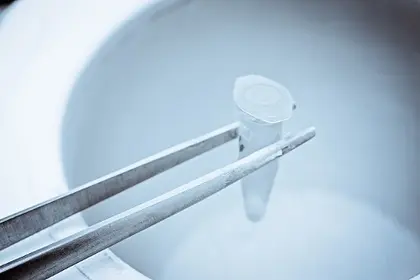Despite a stoic veneer of silence in the name of military secrecy, it is no secret that Ukraine has been suffering heavy casualties in the war Russia unleashed. Many soldiers have died, and some have been wounded or tortured to the point where their reproductive organs either no longer function or have been amputated.
Concerned about not being able to have children, many soldiers have begun storing their sperm cells – literally putting them in a deep freeze – in case they are disabled or die.
JOIN US ON TELEGRAM
Follow our coverage of the war on the @Kyivpost_official.
In November 2023, the Ukrainian parliament supported a bill that provides soldiers with a service of free collection and storage of sperm through cryopreservation, a method of freezing reproductive cells at extremely low temperatures or in liquid nitrogen.
This process has enabled the widows of fallen soldiers to give birth to children in a sort of posthumous procreation.
“The soldiers are thinking about their future. They say that when peace is restored, they want to return home and have their own children. That is what this law aims at,” explained Oksana Dmytriyeva, one of the authors of the document.
“First of all, its goal is to provide defenders with social guarantees, the opportunity to save their reproductive cells at the expense of the state.”
However, Ukrainian lawyer Olena Babych found a loophole in the law. In January, she wrote on Facebook that according to the new legislation, starting in March, Ukrainian clinics would be obliged to dispose of soldiers’ biomaterial after their death.

FPV Drones Effective in 20-40% of Ukrainian and Russian Strikes, Commander Says
“How to explain to a grief-stricken woman, who just a couple of months ago was drawing up documents with her husband to have a child, that while her husband was defending the state and died, our lawmakers deprived him of the right to become a father after death?!” she asked.
Her post caused a stir, shocking many Ukrainians.
This is our best gene pool. And this can easily be done with a notarized agreement.
Dmytriyeva was against including this norm in the bill, which concerns the preservation of the nation’s gene pool.
“My position is as follows: reproductive cells are the property of whoever keeps them. It is this institution that must decide what to do with them in case of death: dispose of the cells, give them to a spouse, or even transfer them to a common cryobank. Especially since this is our best gene pool. And this can easily be done with a notarized agreement,” she explained.
Her colleague, parliamentarian Mykhailo Radutsky, who chairs of the Committee of the Verkhovna Rada of Ukraine on Public Health, Medical Assistance and Medical Insurance, immediately announced that the norm would be removed from the law, even though he was the author of this initiative.
On Feb. 7, the parliament voted to allow the reproductive cells of fallen servicemen to be stored and used for the birth of children.
“Male and female defenders, whose reproductive cells are stored in cryobanks, must define in their testament a person responsible for the issue in case of their death. If the defender dies, the reproductive cells are stored at the expense of the state for three years. After this term expires, further storage can be extended at the expense of the person specified in the will,” Radutsky said.
And yet, there is the other side of the coin. Halyna Tretyakova, head of the Verkhovna Rada Committee on Social Policy and Protection of Veterans’ Rights, says that the legal consequences of using reproductive cells, as well as the procedure for using biomaterial that contains genetic information, are not clearly defined in the Civil Code of Ukraine.
“Posthumous use of reproductive cells (posthumous paternity), as well as cloning, abortion, transplanting, euthanasia and other issues belonging to the fourth generation of human rights are under debate in many countries,” she noted.
According to Tretyakova, the corresponding law was supposed to regulate the use of biomaterial in case of injury, trauma, illness or torture, disabling the soldier to the point of not being able to have children.
“That’s why the bill concerned only the wounded. It did not apply to a wider, posthumous use of human cells. The law on benefits for the soldier could not be extended to all civil relations,” Tretyakova explained.
Babych agreed that the lack of legislation that would regulate this issue creates a number of problems.
She called the idea of stipulating the issue of cryopreservation in a testament debatable and believes, for example, that reproductive cells cannot be the subject of a will, as there is no such item of non-property law in the instructions for notarial acts.
“However, there is a compromise solution when a man arranges cryopreservation and a contract is concluded, prescribing the order of using the sperm in different cases,” Babych said.
The situation with female eggs is more complicated.
“To whom will the embryo be transferred? The surrogacy program is impossible when there is only a man. He must then find a woman with indications for surrogacy, marry her and transfer this embryo. So, in reality, the chances are almost zero,” she said.
Ultimately, Ukraine will be struggling to deal with war wounds and demographic issues long after peace returns. And like so many other issues, the future legal ramifications must be addressed now.
You can also highlight the text and press Ctrl + Enter






